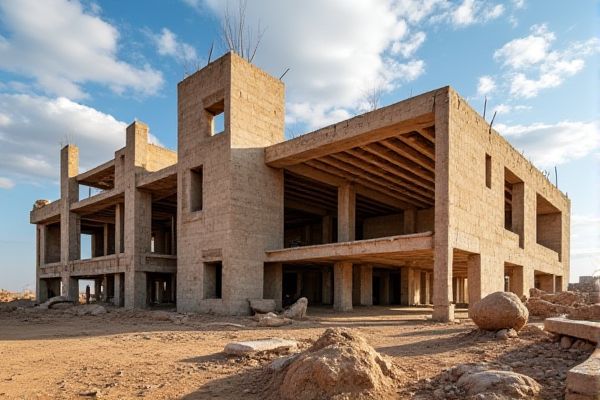
Ethiopia is experiencing significant infrastructure development, creating a variety of job opportunities in structural engineering. Key sectors hiring include construction, public works, and urban development, reflecting the government's focus on improving national infrastructure. Companies are seeking structural engineers with expertise in design, analysis, and project management to contribute to large-scale projects like roads, bridges, and buildings. Familiarity with local building codes and sustainability practices can enhance employability in this growing market.
Job Description
Structural engineering jobs in Ethiopia involve designing, analyzing, and overseeing the construction of infrastructure projects, such as bridges, buildings, and roads. Professionals in this field are tasked with ensuring that structures are safe, durable, and compliant with local regulations and standards. The demand for structural engineers in Ethiopia is growing due to urbanization and developmental projects aimed at improving the nation's infrastructure. Your role may include collaborating with architects, contractors, and government agencies to deliver sustainable and innovative engineering solutions.
Requirement
Structural engineering jobs in Ethiopia require a combination of technical skills and relevant qualifications. A bachelor's degree in civil or structural engineering is typically necessary, along with knowledge of local building codes and regulations. Proficiency in engineering software such as AutoCAD or SAP2000 is often expected, along with strong analytical and problem-solving abilities. Familiarity with sustainable design practices and materials can be advantageous, as Ethiopia increasingly focuses on environmentally friendly construction solutions.
Salary and Perks Expected
Structural engineering jobs in Ethiopia typically offer salaries that range from $1,500 to $4,000 per month, depending on experience and qualifications. You may also find benefits such as health insurance, transportation allowances, and opportunities for professional development. The demand for structural engineers is growing due to ongoing infrastructure projects, creating various job openings across both the public and private sectors. Additionally, working in Ethiopia allows you to engage in unique challenges and contribute to the country's development in sustainable building practices.
Similar Job Names
- Structural Engineer
- Senior Structural Engineer
- Structural Design Engineer
- Structural Analysis Engineer
- Civil Engineer (Structural)
- Project Structural Engineer
- Junior Structural Engineer
- Structural Project Manager
- Bridge Engineer
- Geotechnical Engineer
- Field Engineer (Structural)
- Construction Engineer (Structural)
- Structural Quality Control Engineer
- Structural CAD Technician
- Structural Consultant
- Retaining Wall Engineer
- Seismic Engineer
- Infrastructure Engineer
- BIM Structural Engineer
- Steel Fabrication Engineer
Job Expectation Concept
Structural engineering jobs in Ethiopia are essential for the country's infrastructure development, particularly as urbanization accelerates. Employers typically expect candidates to possess a solid understanding of design principles, materials science, and local building codes to ensure safety and sustainability. You may find opportunities in a range of projects, from residential buildings to large commercial structures and public works. Collaboration with architects, contractors, and regulatory bodies is crucial to successfully navigate the challenges unique to Ethiopia's evolving landscape.
Career Advantage and Weakness
Structural engineering jobs in Ethiopia offer significant career advantages, including a growing demand for infrastructure development due to urbanization and economic growth. This field provides opportunities to work on diverse projects, ranging from bridges to buildings, allowing for a dynamic work environment. However, challenges such as limited resources and a need for advanced technology can impact the quality of engineering practices. Understanding local regulations and environmental conditions is crucial for successfully navigating the engineering landscape in Ethiopia.
Important Thing Must Know
Structural engineering jobs in Ethiopia are experiencing growth due to the country's increasing urbanization and infrastructure development needs. The demand for skilled professionals is on the rise, particularly in sectors such as construction, transportation, and energy. Understanding local regulations and building codes is essential for success in this field, as they can differ significantly from those in other countries. Networking with local engineering firms and participating in relevant workshops can enhance your job prospects and professional knowledge. Opportunities often arise in both private companies and government projects, making this a promising career path for those interested in contributing to Ethiopia's development.
Alternative Career Options
Ethiopia's structural engineering sector offers diverse alternative career options, including roles in construction management, project coordination, and building inspection. Your expertise can also be applied in urban planning, where you can contribute to sustainable development and infrastructure enhancements. Additionally, opportunities exist in consulting firms, focusing on design and analysis for innovative infrastructure projects. The growing emphasis on renewable energy projects in Ethiopia presents a chance to engage in the design of sustainable structures like wind farms or solar energy facilities.
Companies List
- Ethiopian Roads and Transport Authority
- Ethiopian Railway Corporation
- Construction and Business Bank
- MIDROC Technology Group
- Belayab Foods & Plastics
- Berta Construction
- EAB Engineering and Construction
- Addis Ababa City Administration
- Ethiopian Electric Power Corporation
- Sur Construction
List of Ideal City
Addis Ababa stands out as the capital city and a hub for structural engineering opportunities, offering a mix of government and private sector projects. Mekelle, the capital of the Tigray region, boasts developing infrastructure that creates demand for skilled engineers. Dire Dawa, known for its industrial growth, presents unique challenges and projects that require innovative structural solutions. Your career could significantly benefit from exploring the dynamic job market in these cities, fostering professional growth in the field of structural engineering.
 jobs-ethiopia.com
jobs-ethiopia.com